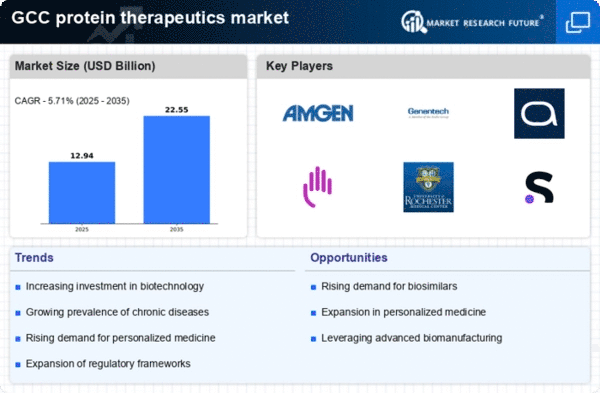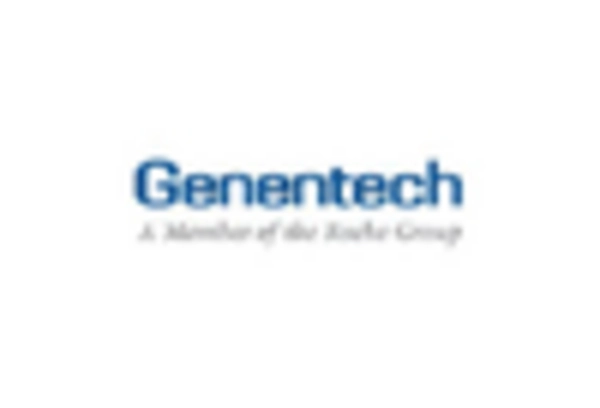Advancements in Biotechnology
Technological advancements in biotechnology are significantly influencing the protein therapeutics market. Innovations in genetic engineering, protein design, and production techniques are enhancing the efficacy and safety profiles of therapeutic proteins. The GCC region is witnessing increased investment in biopharmaceutical research, which is likely to lead to the development of novel protein therapeutics. For example, the introduction of biosimilars is expected to expand treatment options and reduce costs, making therapies more accessible. As a result, the protein therapeutics market is anticipated to grow at a CAGR of around 8% over the next few years, driven by these technological breakthroughs.
Increasing Prevalence of Chronic Diseases
The rising incidence of chronic diseases in the GCC region is a pivotal driver for the protein therapeutics market. Conditions such as diabetes, cancer, and autoimmune disorders are becoming more prevalent, necessitating advanced treatment options. The protein therapeutics market is expected to witness substantial growth as healthcare providers seek innovative solutions to manage these diseases effectively. For instance, the market for monoclonal antibodies, a key segment within protein therapeutics, is projected to reach approximately $100 billion by 2025. This trend indicates a growing reliance on biologics to address complex health issues, thereby propelling the demand for protein-based therapies.
Regulatory Support for Biopharmaceuticals
Regulatory frameworks in the GCC are evolving to support the development and commercialization of biopharmaceuticals, which is a crucial driver for the protein therapeutics market. Authorities are streamlining approval processes for new therapies, thereby encouraging innovation and investment in the sector. This supportive environment is likely to facilitate the entry of new protein therapeutics into the market, enhancing competition and variety for healthcare providers. As regulatory bodies continue to adapt to the unique challenges posed by biologics, the protein therapeutics market is expected to expand, with an increasing number of products receiving market authorization.
Growing Investment in Healthcare Infrastructure
The GCC region is experiencing a surge in healthcare infrastructure investment, which is positively impacting the protein therapeutics market. Governments are prioritizing healthcare development, leading to the establishment of advanced medical facilities and research institutions. This investment is crucial for the effective delivery of protein therapeutics, as it enhances access to cutting-edge treatments. Furthermore, the establishment of specialized centers for biopharmaceutical research is likely to foster innovation and collaboration among stakeholders. As a result, the protein therapeutics market is poised for growth, with improved access to therapies and increased patient awareness driving demand.
Rising Awareness of Biologics Among Healthcare Professionals
There is a notable increase in awareness and understanding of biologics among healthcare professionals in the GCC, which serves as a significant driver for the protein therapeutics market. As medical practitioners become more informed about the benefits and applications of protein-based therapies, they are more likely to prescribe these treatments. Educational initiatives and professional development programs are contributing to this trend, enhancing the knowledge base within the medical community. Consequently, the protein therapeutics market is expected to benefit from a growing acceptance of biologics, leading to increased utilization and a broader range of treatment options for patients.
















